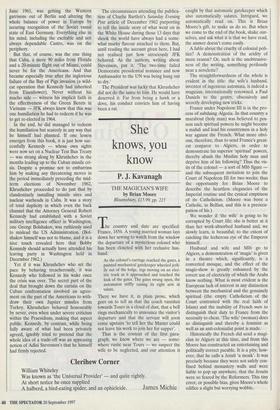She knows, you know
P. J. Kavanagh
THE MAGICIAN'S WIFE by Brian Moore Bloomsbury, £15.99, pp. 215 he country and date are specified: France, 1856. A young married woman lays down her sewing to watch from the window the departure of a mysterious colonel who has been closeted with her reclusive hus- band.
As the colonel's carriage reached the gates, a painted mechanical gatekeeper wheeled jerk- ily out of the lodge, legs moving on an elec- tric track as it approached and touched the lock of the gates. The gates swung open, the automaton stiffly raising its right arm in salute.
There we have it, in plain prose, which goes on to tell us that the coach vanishes towards Tours in a cloud of dust, that a bell rings mechanically to announce the visitor's departure and that the servant will soon come upstairs 'to tell her the Master could not leave his work to join her for supper'.
That is the content of the first para- graph; we know where we are — some- where rustic near Tours — we suspect the wife to be neglected, and our attention is caught by that automatic gatekeeper which also automatically salutes. Intrigued, we automatically read on. This is Brian Moore's gift, to make us do so. But when we come to the end of the book, shake our- selves, and ask what it is that we have read, the answer doesn't come easily.
A fable about the cruelty of colonial poli- tics? A demonstration of the aridity of mere reason? Or, such is the unobtrusive- ness of the writing, something perilously near a novelette?
The straightforwardness of the whole is evident in the title: the wife's husband, inventor of ingenious automata, is indeed a magician, internationally renowned, a Paul Daniels to the gentry, obsessively and secretly developing new tricks.
France under Napoleon III is in the pro- cess of subduing Algeria. In that country a marabout (holy man) was believed to pos- sess such spiritual powers he might become a mandi and lead his countrymen in a holy war against the French. What more obvi- ous, therefore, than to send France's great- est conjuror to Algiers, in order to demonstrate his superior 'spiritual' powers, thereby abash the Muslim holy man and deprive him of his following? Thus the vis- its of the colonel — a sort of MI6 figure and the subsequent invitation to join the Court of Napoleon III for two weeks; thus the opportunity for Brian Moore to describe the heartless elegancies of the Imperial routine and the cynical emptiness of its Catholicism. (Moore was born a Catholic, in Belfast, and this is a preoccu- pation of his.) We wonder if 'the wife' is going to be corrupted by Court life; she is better at it than her work-absorbed husband and, we slowly learn, is beautiful; to the extent of catching the lecherous eye of the Emperor himself.
Husband and wife and MI6 go to Algiers, a demonstration of 'magic' is given in a theatre which, significantly, is a converted mosque, and the effect of the magic-show is greatly enhanced by the covert use of electricity of which the Arabs know nothing. What is most evident is the European lack of interest in any distinction between the mechanical and the genuinely spiritual (the empty Catholicism of the Court contrasted with the real faith of Islam) and the inability of French men to distinguish their duty to France from the necessity to cheat. The wife' (woman) does so distinguish and thereby a feminist as well as an anti-colonialist point is made.
Historically the French did send a magi- cian to Algiers at this time, and from this Moore has constructed an entertaining and politically correct parable. It is a pity, how- ever, that he calls a Jesuit 'a monk'. It was precisely because they were not safely con- fined behind monastery walls and were liable to pop up anywhere, that the Jesuits were so feared by the Reformers. This, tiny error, or possible bias, gives Moore's whole edifice a slight but worrying wobble.


































































 Previous page
Previous page